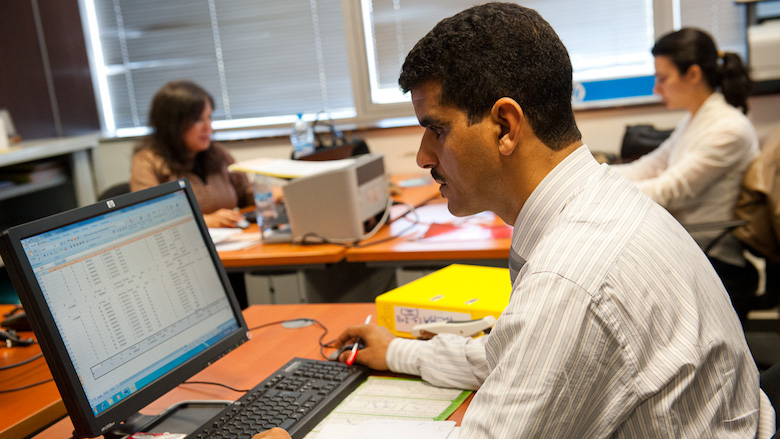A new project to address the challenges of youth unemployment
Each year, thousands of young Moroccans attempt to enter the job market every year but meet insurmountable challenges. The World Bank’s Morocco Country Economic Memorandum (CEM), released in 2017 and titled Morocco 2040 Emerging by Investing in intangible capital, presented the portrait of four young Moroccans, Amine, Nisrine, Kawtar and Reda, each with diverse family and educational backgrounds. Consequently, their job searches varied from a desperate quest in the face of limited opportunities to one where numerous opportunities could arise. Their differing experiences illustrate the multidimensional nature of Morocco’s social disparities, which can be geographic, economic or based on gender and the quality of schooling.
The World Bank’s new Human Capital Project, which introduced an index classifying countries per their human capital performance, highlighted the untapped potential of Morocco’s people. The country is aware of the daunting challenge of building up its human capital and its importance for transforming Morocco into a world class economy. A myriad of training and employability programs have been launched, yet their fragmentation and the disconnect between labor market demand and available skills have stood in the way of fully tapping the immense potential of its youth population.
The World Bank has long stressed the challenge of youth inactivity as an impediment to growth. In its 2012 Promoting Youth Opportunities and Participation in Morocco report, the Bank emphasized the critical need to identify and develop tailored programs for NEETs (Not in education, employment or training), who make up one third of the Moroccan youth population. The study found that the job search struggle is particularly acute among the less qualified and even more difficult for women, whether qualified or not. Yet current government employability programs are focused on young people with higher educational degrees and are not tailored to address the needs of either women or lower-skilled youth.
Building on the experience of the previous World Bank-supported Strengthening Micro-Entrepreneurship for Disadvantage Youth project which provided valuable lessons on the requisites for a successful youth empowerment program, the World Bank and the government of Morocco have just launched a new program. The new Supporting the Economic Inclusion of Youth project will focus on young people in the Marrakesh-Safi region of Morocco. The program has an innovative institutional set up and pragmatic operational approach to offer integrated support to youth and boost their employability, by mobilizing central and local-level authorities in the program’s roll out.
Per the new Country Partnership Framework’s citizen participation component, beneficiaries of this project will be part and parcel of the project’s successful implementation. They will be involved in the monitoring and evaluation effort of each of the project’s components to regularly share their feedback on effective ways to improve support programs.
The project will be launched as a pilot in the Marrakesh-Safi region, and will be subsequently scaled up at the national level. The program’s objectives are threefold:
- Offering tailored orientation and training services to low-qualified youth in the Marrakesh-Safi region through dedicated Youth Employment Centers (EEJs) established throughout the region’s 7 provinces and in the Marrakesh prefecture. Managed by Morocco’s employment agency, ANAPEC, these centers will provide job-matching services and training geared to address labor market demand for technician-level professionals.
- Develop an entrepreneurship ecosystem to help aspiring entrepreneurs in the region find guidance as well as technical and financial support to launch their businesses in competitive sectors. The ecosystem will be built upon a network of entrepreneurship centers, under supervision of the Regional Investment Center (CRI), which will be tuned to regional labor market demand and will identify economic activities and local value chains with high growth potential. It will be complemented by a technical and financial support program to young entrepreneurs, provided by INDH (National Initiative for Human Development), and targeting youth with viable ideas for new enterprises.
- Build regional authorities’ capacities to develop synergies and enhance local-level youth inclusion programs. The purpose is to develop best practices which can sustainably be embedded in regional development programs where specific attention will be paid to promoting youth inclusion and supporting local private sector’s growth.
Towards an innovative approach to youth inclusion
This project aims to instill a new dynamic in the area of youth inclusion. Rather than having each department and sector work in silos to develop skills, promote job intermediation and respond to labor market demand in a disconnected way, the new program is intended to promote greater synergies among key players, including the relevant ministries and public agencies, local nongovernmental organizations which are attuned to disadvantaged youth’s concerns as well as the private sector. The new program is also based on the principle that investments in skills development need to undergo a shift to focus on private sector demand with stronger support for on-the-job training and bringing lower skilled young people from the margins into the economic mainstream. Finally, as female labor market participation remains a critical challenge for Morocco’s development prospects, with less than 25% of working-age urban women in the labor market, targeted measures will be adopted to promote female participation in order to empower them and realize their immense and untapped labor and economic potential.

